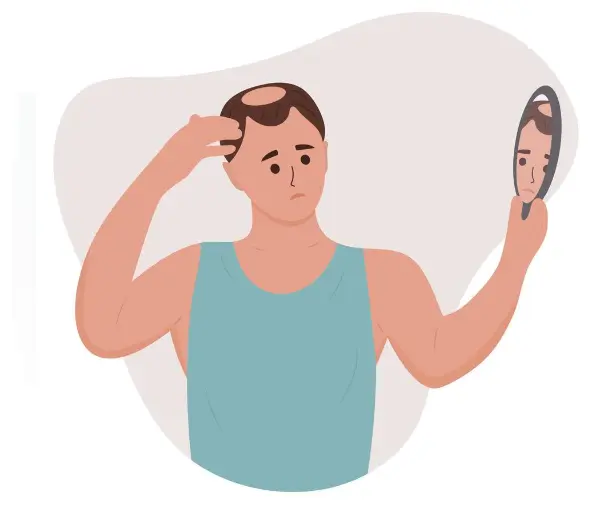No products in the basket.
Hair Loss
Losing your hair is normally nothing to be concerned about, however it can be distressing. Treatment may be beneficial for certain forms of hair loss. Hair loss, also known as alopecia, is a common condition that affects millions of people worldwide. It can occur gradually or suddenly and can affect the scalp or other parts of the body.

Hair Loss
While hair loss is often associated with ageing, it can happen at any age and for various reasons, including genetics, medical conditions, and lifestyle factors. Understanding the causes of hair loss and the available treatments can help individuals manage this condition effectively.
The Causes of Hair Loss
Hair loss can result from a variety of factors, including:
Genetics:
- Androgenetic Alopecia: Also known as male-pattern baldness and female-pattern baldness, this is the most common cause of hair loss. It is hereditary and can begin as early as the late teens or early 20s in men and usually starts with a receding hairline and thinning at the crown. In women, it typically presents as overall thinning, especially at the crown.
Hormonal Changes:
- Pregnancy and Childbirth: Many women experience hair loss after giving birth due to hormonal shifts.
- Menopause: The decrease in oestrogen levels during menopause can lead to thinning hair or increased shedding.
- Thyroid Disorders: Both hyperthyroidism and hypothyroidism can cause hair loss.
Medical Conditions:
- Alopecia Areata: An autoimmune disorder where the immune system attacks hair follicles, leading to patchy hair loss.
- Scalp Infections: Fungal infections like ringworm can cause hair loss in patches.
- Chronic Illness: Conditions like lupus, diabetes, and certain cancers can result in hair loss.
Medications and Treatments:
- Chemotherapy: Cancer treatments often cause hair to fall out because they target rapidly dividing cells, including hair follicles.
- Blood Thinners, Antidepressants, and Blood Pressure Medications: Certain medications list hair loss as a potential side effect.
Stress and Lifestyle Factors:
- Telogen Effluvium: A condition where significant stress or a traumatic event pushes a large number of hair follicles into a resting phase, leading to widespread hair shedding.
- Poor Nutrition: Lack of essential nutrients can weaken hair and lead to loss.
Physical Trauma:
- Hair Treatments and Styling: Excessive use of heat, chemicals, or tight hairstyles can damage hair and lead to breakage or hair loss.
Treatments Available for Hair Loss
Several treatment options are available for hair loss, depending on the underlying cause:
Medications:
- Minoxidil (Rogaine): A topical treatment available over the counter that stimulates hair growth and can slow down hair loss.
- Finasteride (Propecia): An oral prescription medication for men that reduces the production of a hormone linked to hair loss.
- Spironolactone: A medication often prescribed to women that helps reduce androgen levels, which can contribute to hair loss.
Hair Transplant Surgery:
- Follicular Unit Transplantation (FUT): Involves taking a strip of scalp from the back of the head and transplanting it to the balding areas.
- Follicular Unit Extraction (FUE): Individual hair follicles are extracted and transplanted to thinning or balding areas, leaving minimal scarring.
Laser Therapy:
- Low-Level Laser Therapy (LLLT): A treatment that uses red light to stimulate hair follicles and promote hair growth.
Platelet-Rich Plasma (PRP) Therapy:
- PRP Injections: A treatment where a patient’s blood is drawn, processed to concentrate the platelets, and then injected into the scalp to promote hair growth.
Lifestyle Changes:
- Healthy Diet and Stress Management: A balanced diet rich in nutrients and stress-reducing activities can support overall hair health and reduce hair loss.
What Vitamins Are Good for Hair Loss?
Certain vitamins and minerals are essential for maintaining healthy hair and may help reduce hair loss:
- Biotin (Vitamin B7): Essential for hair health, biotin strengthens hair and promotes growth.
- Vitamin D: Low levels of vitamin D have been linked to hair loss, and supplementation may support hair follicle health.
- Vitamin E: An antioxidant that helps reduce oxidative stress in the scalp, promoting hair growth.
- Iron: Iron deficiency can lead to hair thinning, so maintaining adequate iron levels is crucial.
- Zinc: Zinc plays a vital role in hair tissue growth and repair. A deficiency can lead to hair loss.
What Deficiency Causes Hair Loss?
Several nutrient deficiencies can contribute to hair loss:
- Iron Deficiency: Iron is critical for producing haemoglobin, which carries oxygen to hair follicles. A lack of iron can result in hair thinning and loss.
- Vitamin D Deficiency: Vitamin D plays a role in creating new hair follicles. Low levels of this vitamin can slow hair growth and cause hair loss.
- Biotin Deficiency: Biotin is important for hair strength and growth. A deficiency can lead to brittle hair and hair loss.
- Protein Deficiency: Hair is primarily made of protein, so insufficient protein intake can weaken hair and lead to loss.
When to Worry About Hair Loss?
While some hair loss is normal, particularly as part of the ageing process, there are times when it may be cause for concern:
- Sudden or Patchy Hair Loss: If you experience sudden or patchy hair loss, it could indicate an underlying medical condition like alopecia areata or an infection.
- Thinning or Bald Spots: If you notice significant thinning or the appearance of bald spots, it might be time to seek medical advice.
- Excessive Shedding: Losing more hair than usual, especially if it comes out in clumps, can be a sign of telogen effluvium or another condition.
- Hair Loss Accompanied by Other Symptoms: If hair loss is accompanied by symptoms like fatigue, weight changes, or skin issues, it could be related to a nutritional deficiency or hormonal imbalance.
If you’re concerned about your hair loss, it’s best to consult with a healthcare professional to determine the cause and explore appropriate treatment options.

